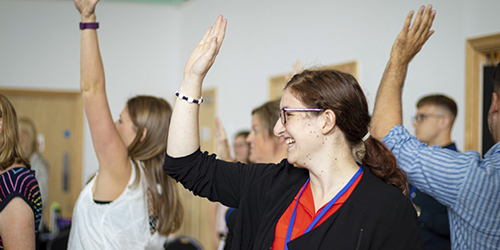Yassamin Sheel is the National SCITT Lead for United Teaching, and is based with our Northern schools. In this post, she discusses how asking for help and responding well to feedback is a fundamental skill for all trainee teachers.
As a profession, teachers receive a lot of feedback, perhaps more so than in other careers. This is so that we can get better at our jobs through constructive advice, but for many trainees, it can come as a bit of a culture shock. In general, I think people find it difficult to ask for help - they see it as a weakness, but it isn’t! To move forward in teaching, you need help in the form of feedback, and you need to have the ability to act on it.
This is reaffirmed by the Teachers’ Standards, which all trainees need to fulfil in order to gain their QTS. Standard 8 talks about "knowing how and when to draw on advice and specialist support", as well as "improving teaching through appropriate professional development, responding to advice and feedback from colleagues". In practice, this might mean drawing upon the expertise of your SEN team if you have a pupil with speech and language difficulties in your class. The next step might be to ask a colleague to observe you in the classroom with the pupil to see if there’s anything you could do differently to support them. Your SENCO might also point you towards research in this specific area, as well as practitioners in your school that you could observe. Seeking out this guidance doesn’t signal that you’re doing a bad job – it shows that you’ve got the drive to improve your practice with your students’ best interests at heart.
“The most valuable thing about your relationship with your mentor is the opportunity to get a second perspective on things which can be easy to overlook in your own practice. In my trainee year I taught a class with whom I sometimes experienced issues with low-level disruption. Whilst I was able to identify the problem, my mentor was able to suggest key adjustments to routines in my lesson which prevented opportunities for disruption from arising. The advice of a mentor should be welcomed as an opportunity to develop both your practice and your ability to reflect on your behaviours and routines in the classroom.”
Eleanor Stead – United Teaching graduate
It is important that you respond well to constructive feedback as it will allow you to move on in your journey towards being a qualified teacher. Your training year is such a great opportunity to have these discussions with your mentor. Allow your mentors to challenge you so you can have those direct conversations that have the greatest impact on your development and growth.
Acting on feedback takes practice, and you won’t always get it right first time. You might struggle with it initially, but persevere as one day it will click! We encourage our trainees to ‘ask the expert’ in their schools – whether that’s for behaviour, SEN, parents’ evenings, or whatever area you want to improve in. If collecting homework is your Achilles’ heel, find the teacher who always gets that homework in! Whatever you do, don’t worry about whether people will judge you for asking them – continuous improvement is a fundamental part of being a teacher, it’s not something to be afraid of. That’s also why ‘continuous improvement’ is an integral part of United Learning’s ethos – not just for trainees but for staff and students at every stage of their journey.
People sometimes call teaching a difficult profession, but I think it just takes time and patience to become good at it. Sometimes people give up before they have a chance to develop their skills, which is a real shame because you’re always going to experience challenges as a teacher; what’s important is how you learn from your mistakes and grow. The best teachers are the ones who never stop learning, who actively seek feedback from their colleagues and are never too proud to ask for help.



